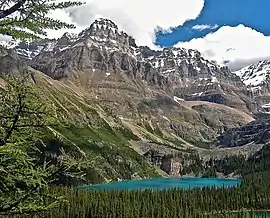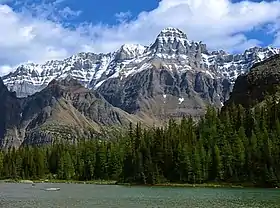Mount Huber
Mount Huber is a 3,348-metre (10,984-foot) summit located two kilometers east of Lake O'Hara in the Bow Range of Yoho National Park, in the Canadian Rockies of British Columbia, Canada. Its nearest higher peak is Mount Victoria, 1.0 km (0.62 mi) to the north-northeast.[2] Mount Huber is a secondary summit of Mount Victoria which is on the Continental Divide.
| Mount Huber | |
|---|---|
 Mount Huber seen above Lake O'Hara | |
| Highest point | |
| Elevation | 3,348 m (10,984 ft) [1] |
| Prominence | 158 m (518 ft) [2] |
| Parent peak | Mount Victoria (3464 m)[2] |
| Coordinates | 51°22′13″N 116°18′44″W [3] |
| Geography | |
 Mount Huber Location of Mount Huber in British Columbia  Mount Huber Mount Huber (Canada) | |
| Location | British Columbia, Canada |
| Parent range | Canadian Rockies |
| Topo map | NTS 82N08[3] |
| Geology | |
| Age of rock | Cambrian |
| Type of rock | Limestone |
| Climbing | |
| First ascent | 1903 George Collier, E. Tewes, Christian Bohren, Christian Kaufmann[2] |
| Easiest route | Scrambling class 4 |
History
Named in 1903 by Samuel Allen for Emil Huber, a Swiss climber, who, with Carl Sulzer, were first to climb Mount Sir Donald in the Selkirk Mountains.[2] The first ascent of the Mount Huber was made in 1903 by George Collier, E. Tewes, Christian Bohren, and Christian Kaufmann.[4] The mountain's name became official in 1924 when approved by the Geographical Names Board of Canada.[3]
Geology
Mount Huber is composed of sedimentary rock laid down during the Precambrian to Jurassic periods.[5] Formed in shallow seas, this sedimentary rock was pushed east and over the top of younger rock during the Laramide orogeny.[6]

Climate
Based on the Köppen climate classification, Mount Huber is located in a subarctic climate with cold, snowy winters, and mild summers.[7] Temperatures can drop below −20 °C with wind chill factors below −30 °C. Precipitation runoff from Mount Huber drains into tributaries of the Kicking Horse River which is a tributary of the Columbia River.
See also
References
- "Mount Huber, Alberta". Peakbagger.com.
- "Mount Huber". Bivouac.com. Retrieved 2018-11-17.
- "Mount Huber". Geographical Names Data Base. Natural Resources Canada. Retrieved 2018-11-17.
- "Mount Huber". PeakFinder.com. Retrieved 2019-08-17.
-
Belyea, Helen (1960). "The Story of the Mountains in Banff National Park" (PDF). Geological Survey of Canada. Archived (PDF) from the original on 2 October 2015. Retrieved 2019-06-23. Cite journal requires
|journal=(help) - Gadd, Ben (2008). "Geology of the Rocky Mountains and Columbias". Cite journal requires
|journal=(help) - Peel, M. C.; Finlayson, B. L.; McMahon, T. A. (2007). "Updated world map of the Köppen−Geiger climate classification". Hydrol. Earth Syst. Sci. 11: 1633–1644. ISSN 1027-5606.